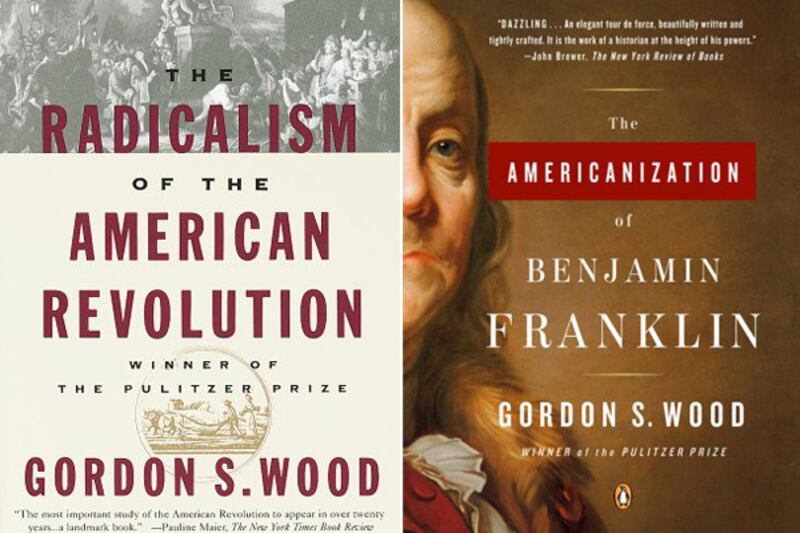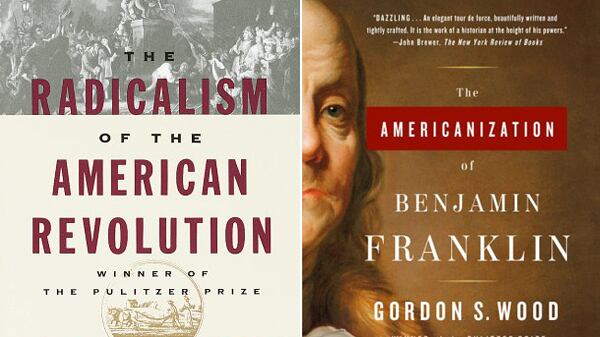
I’ve long chafed at the phrase, “The Founders,” to refer to the revolutionaries and Constitution writers of the 1770s and 1780s.
The phrase seeks to cut the history out of American history. In 1776, the bigger American colonies were societies more than 150 years old. Those societies in turn carried with them the cultural DNA of even older societies, both European and African.
What was founded between 1775 and 1789 was the American Republic, not the American nation. But even for that new polity, there was no “year zero.” The American Republic was built out an inherited past. The process of detachment from that past was long, traumatic, and still incomplete as of 1789. Few have thought harder about this process than Gordon Wood. These two books together present Wood’s classic statement of the transformation of one American era into another.
In The Americanization of Benjamin Franklin, Wood tells the following story:
In 1747, Franklin organized an irregular state militia to defend western Pennsylvania from the Indians. The Philadelphia regiment elected Franklin its colonel. Franklin declined, professing himself “unfit.” Franklin was not moved by his utter lack of military experience. (As Wood wryly notes, “this never stopped other eighteenth-century gentlemen.") Franklin regarded himself as unfit because in 1747 he was still actively engaged in his printing business. This business had already made the then-forty one year old Franklin one of the richest men in Philadelphia. But no matter how rich, a man actively engaged in the printing trade could never qualify as a “gentleman,” and was thus disqualified from command
The next year, Franklin retired from business. He invested in land and made loans at interest. When another war came in 1756, Franklin was nearly 50. This time, however, he accepted the colonelcy. He had not learned anything more about military affairs. But he was a gentleman now.
The 18th century America colonies constituted a subculture within a larger British North Atlantic world that also included Nova Scotia, Bermuda, the sugar islands of the Caribbean, and the British Isles. The 18th century Americans shared the hierarchical and monarchical values of their insular compatriots.
When called to church on a Sunday morning, the people of a southern colony would not enter all at once–or even family by family. The commonfolk of the parish would enter first. Then the wives and children of the major landowners. These squires assembled as a body, and entered together after all others had sat down.
True, the colonies lacked the extremes of wealth and poverty to be seen in the mother country. As Wood notes, the most opulent house in colonial America, William Byrd’s Westover, was 65 feet long. The Marquess of Rockingham had a house ten times the size; the Sackvilles’ palace of Knole had 365 rooms.
But if the hierarchy was truncated at top and bottom, it was finely elaborated in between. In New England, people carefully assessed who ranked as a mere husbandman, who counted as a yeoman, who should be addressed as “Mr.,” and who was entitled to the yet more respectful, “Your honor.”
African slaves occupied the very lowest rank in a vast system of unfreedom and dependency. Yet their condition differed only in degree from that of white indentured servants and apprentices. The servant or the apprentice might be held only for a term of years rather than for life. The apprentice might expect some kind of support and patronage after his term expired. While the indenture or apprenticeship lasted, however, white servants could be beaten just like a black slave; could be refused permission to marry; and could discover that their service had been sold to a new master.
The American revolution collapsed this elaborate hierarchical world into a new scheme that recognized only two statuses, slave and free.
In this new world, the revolutionary generation expected that political authority would cease to be monopolized by the well-born, but would be inherited instead by the public-spirited. Education and virtue would be the only aristocracy–or so the leading revolutionaries assumed.
As much as the revolutionaries disagreed among themselves, there was one thing they did agree upon: republican politics had no place for the assertion of purely personal commercial self-interest.
Franklin–of all the revolutionaries the one most rooted in the world of trade—argued most passionately at the Convention of 1787 that federal officers should serve without pay, so as to preclude from officeholding anyone with any pecuniary motive. Yet in upholding this view, Franklin was not seeking to protect wealth. He was seeking to make wealth subservient to the public good. What would today’s Tea Party make of this statement? “Private property is a creature of society, and is subject to the calls of that society whenever its necessities shall require it, down to the last farthing.” No, that’s not Karl Marx–that’s the Benjamin Franklin of the Constitutional period. (p. 219, The Americanization of Benjamin Franklin.)
Nor was Franklin unique. Modern libertarianism was an utterly foreign mode of thought to the revolutionary generation.
Ironically, those members of the revolutionary generation who sound most libertarian to our modern ears (Thomas Jefferson for example) were the most mistrustful of commerce and enterprise. Those most sympathetic to commerce and enterprise (Alexander Hamilton) sound least libertarian.
Yet as commerce advanced–and as pre-modern forms of authority based on claims of public virtue were rejected–American politics evolved in directions more and more recognizable to us
In 19th century America, equality would come to mean “not just that a man was as good as his neighbor and possessed equal rights, but that he was ‘weighed by his purse, not by his mind, and according to the preponderance of that, he rises or sinks in the scale of individual opinion.’ That was a kind of equality no revolutionary had anticipated.” (p. 243, Radicalism of the American Revolution.) The quoted words come from one of the correspondents of the painter and inventor, Samuel FB Morse.
It’s a very strange thing that three years of passionate invocation of “the Constitution” and “the Founders” should have led so many Americans to know less about them, not more.
Few historians have done so much to close the distance between us and them as Gordon Wood, whose work seems even timelier now than when first published.





